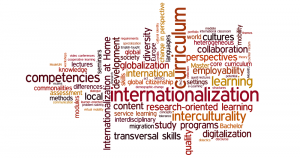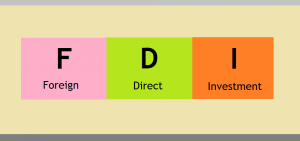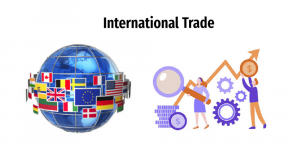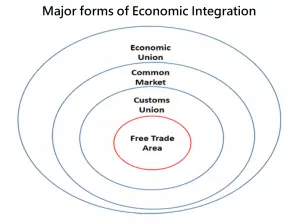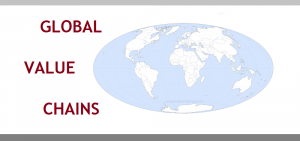Psychic Distance is an often discussed theme in internationalization of firms. Psychic Distance refers to the differences in the business environment between the nation of origin (of a firm) and the foreign market. This is considered a one of the factors that disturbs the flow of information between firm and the market. Greater the Psychic […]
International Business
The Born global model of Internationalization
Some newer firms are not gradually approaching global markets but they are jumping directly into global markets. Such firms are termed ‘Born Globals’. The Born Global Model is a business strategy in which a company engages in international business right from its inception. This is a contradictory approach to most other traditional internationalization models, which […]
The Uppsala Internationalization Model
The Uppsala model of Foreign Direct Investment (FDI) is a theory that explains the internationalization process of firms. The model argues that firms invest in countries which are similar to their home countries. During the 1970’s a number of Swedish researchers at the university of Uppsala focused their interest on the internationalization process. They studied […]
Dunning’s Eclectic Paradigm (OLI Framework) Explained
The electric paradigm (OLI) remains the most dominant theory to explain the activities of Multinational Enterprises (MNEs). Developed by Dunning, the OLI model explains that the choice of market selection depends on three economic advantages known as ownership, location and internalization advantages. Eclectic Paradigm (OLI) The eclectic paradigm or the OLI framework (OLI stands for […]
Understanding a Multinational Corporation (MNC)
When discussing a Multinational Corporation (MNC), terms like Multinational Enterprise (MNE) and Transnational Corporation (TNC) are also commonly used. While they are all involved in international operations, there are some distinctions between these terms. An MNC is a firm that is involved in the production of goods or services in at least one country other […]
Economic Integration: Various Levels Explained
Economic integration is an arrangement between several countries to improve trade between them. In the global landscape, Economic Integration usually can be classified into various additive levels. Regional Economic Integration (Preferential Trade Agreement) The WTO promotes free trade on a global basis, however countries in each of the world’s regions are seeking to liberalize trade […]
Organizational Structures for Global Marketing
The success of a global strategy is influenced by the selection of an appropriate organizational structure to implement that strategy. The ideal structure of such as an organization should be a function of: the products and services to be sold in a marketplace the external and internal environment Theoretically, the way to develop a global […]
Internationalization: Definition, Models, Barriers
Internationalization is the process of expanding business operations beyond domestic boundaries to international markets using various market entry modes. Let’s understand the motives behind a company’s decision to compete in global markets, and the right time to internationalize. What is Internationalization? Today most large companies operate outside their home markets. “Internationalization” is the term used […]
Understanding Free Trade: Definition, Pros, and Cons
Put simply, Free trade is international trade where there are no government policies restricting the import and export of goods and services. While economists consider this as the best approach to maintain a healthy global economy, this is more of a theoretical policy become some restrictions do exist. Free trade means importing and exporting without […]
Special Economic Zone (SEZ): Case Studies
A special economic zone (SEZ) is an area within a country that has business-friendly trade and business laws and is subjected to different economic regulations from the rest of the country. SEZs are set up to boost economic activity, promote exports, boost investments, develop infrastructure as well as create employment opportunities. Special Economic Zone (SEZ): […]
Comparative Advantage trade theory
Comparative advantage is the ability of a country to produce a particular good or service more efficiently (at a lower cost) than its trading partners. Comparative Cost Advantage is a situation in which a country, individual, company or region can produce a good at a lower opportunity cost than a competitor. The Country concentrates on […]
Understanding Global Value Chains (GVCs)
Understand the importance and characteristics of global production chains. Understand the political, economic, ethical and social issues raised by the existence of global production chains. Understand the nature of employment and labor rights in identified emerging economies. What are Global Value Chains? (GVC) Global value chains are the fragmented cross-border stages, people and activities required […]
International Trade: Concepts & Theories
International (Global) Trade concepts and theories. Understand free trade, protectionism, role of bodies like WTO in promoting free trade, regional economic integration and trade agreements. Understand the various theories of trade that explain why countries trade, understand the factors affecting countries’ trade patterns, and understand how global efficiency is increased through free trade. International Trade […]
Globalization: Concepts and resource guide
Globalization changes the business environment and presents new opportunities as well as pose new challenges to organisations operating in a global business. This resource guide helps understand globalization and key related concepts. What is Globalisation ‘New’ vs. ‘Old’ Forms of Integration Globalization refers to the increasing integration of economies around the world, particularly through trade […]
Trade Protectionism: Impact of Tariffs and Trade Barriers on International Trade
There are benefits to free trade, but some parties could lose out as well; that is why governments may feel the need to interfere and regulate certain aspects of the trade. Let’s understand why governments control trade and identify methods governments use to control trade. Introduction to Trade Tariffs Tariff refers to taxes or duties levied […]
What trade risks and financial risks does a multinational company face?
With increased globalization, many companies see the benefits of engaging in international trade; there’s opportunity to earn more revenue and to place your products and services in front of a wider audience. However, a business should also weigh in the risks associated with international trade. While one can mitigate most of these risks, certain risks […]
Foreign Direct Investment (FDI): Basics, Concepts, Case Studies
Foreign Direct Investment (FDI) explained. Understand concepts, key terms, and also find case studies related to FDI. These terms are commonly used while talking about FDI. MNCs/MNEs – nomenclature of foreign business FDI-inward/outward Domestic/ cross border business Subsidiaries / affiliates / parent company Home country / host country Rankings / indexes- Ease of doing business […]
US-China trade conflict
The US-China trade war has been escalating for some time now, especially after the Covid-19 pandemic. More companies are planning to diversify their supply chain after the Covid-19 pandemic crippled their business. Also, it’s getting too bureaucratic to be a foreigner in China and hence companies are looking to move to other countries in Asia […]
Role of WTO (World Trade Organization) in International Trade
What is WTO (World Trade Organization) and its importance in international trade. Introduction to WTO The World Trade Organization (WTO) is a global body that deals with the rules of trade between nations. The WTO strives to ensure trade flows as freely and predictably as possible. WTO replaced the GATT (General Agreement on Tariffs and […]
